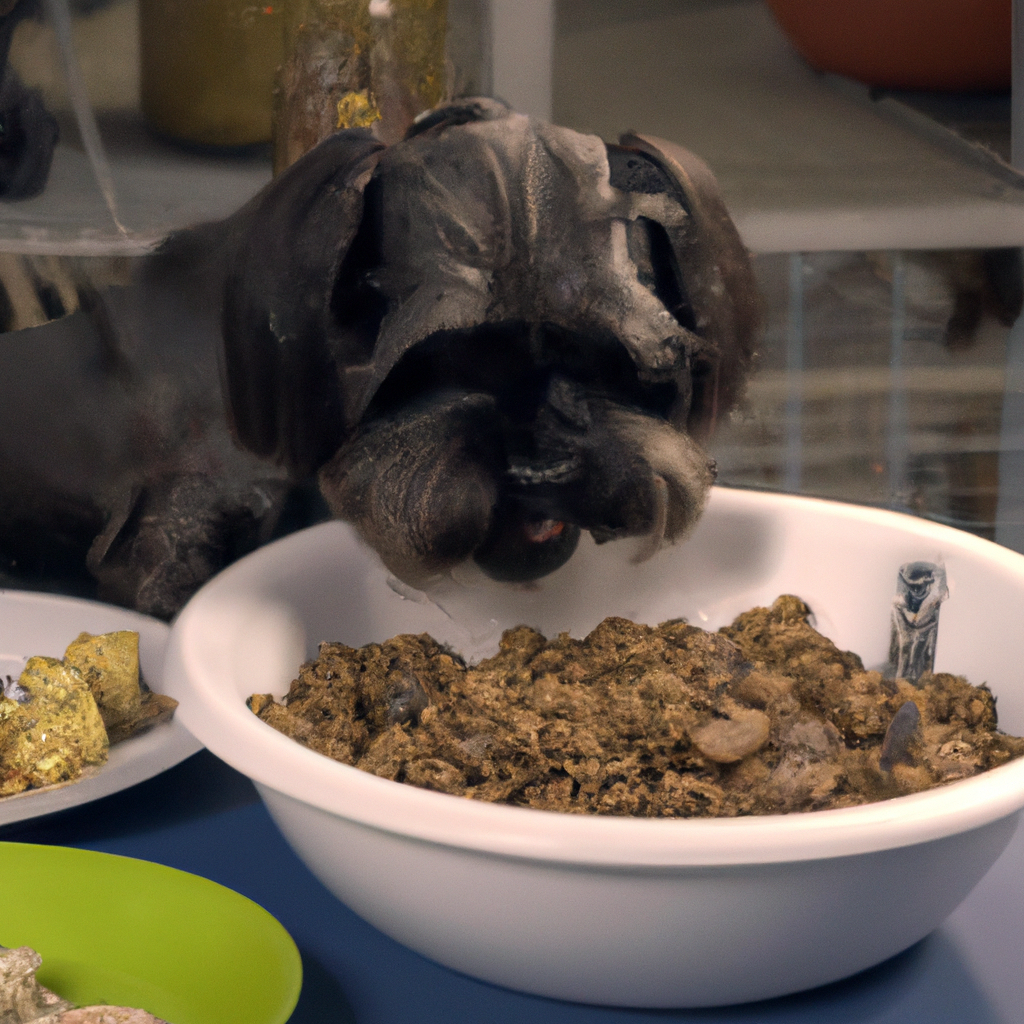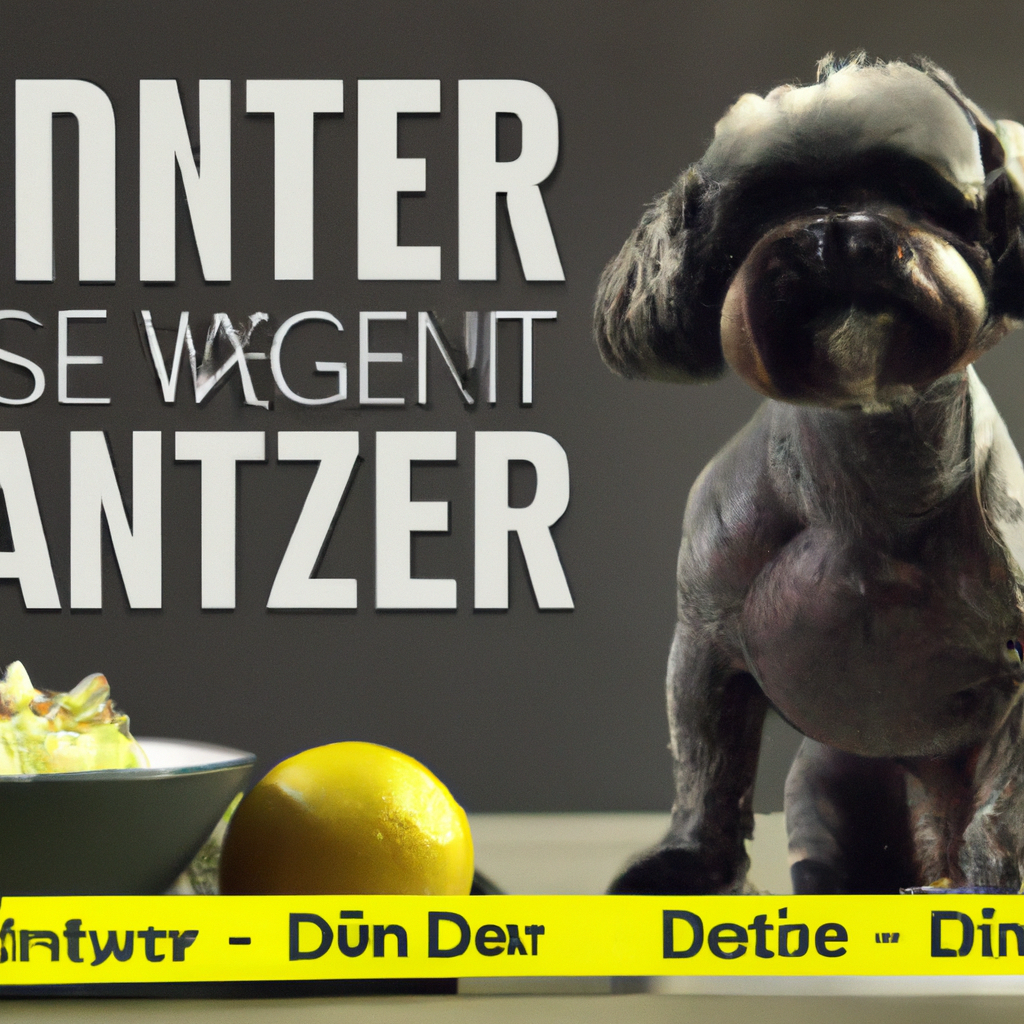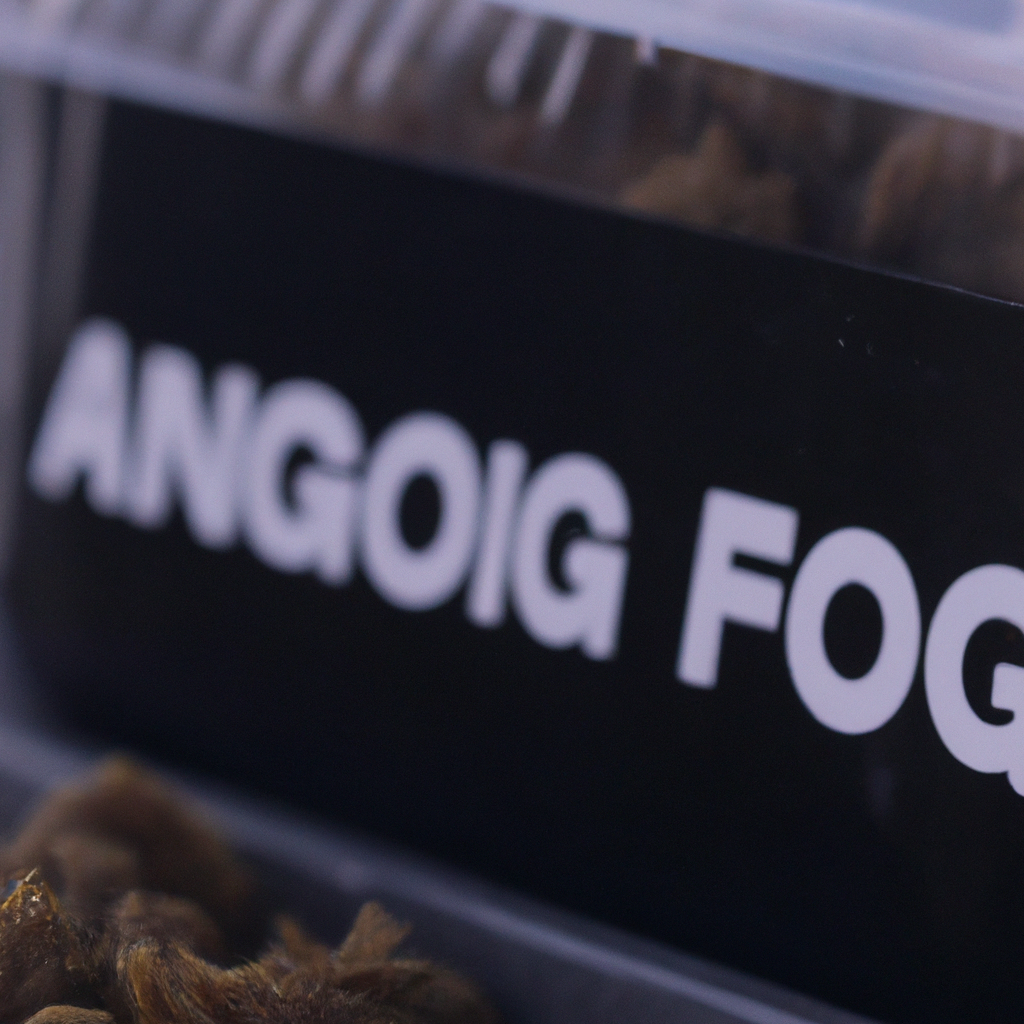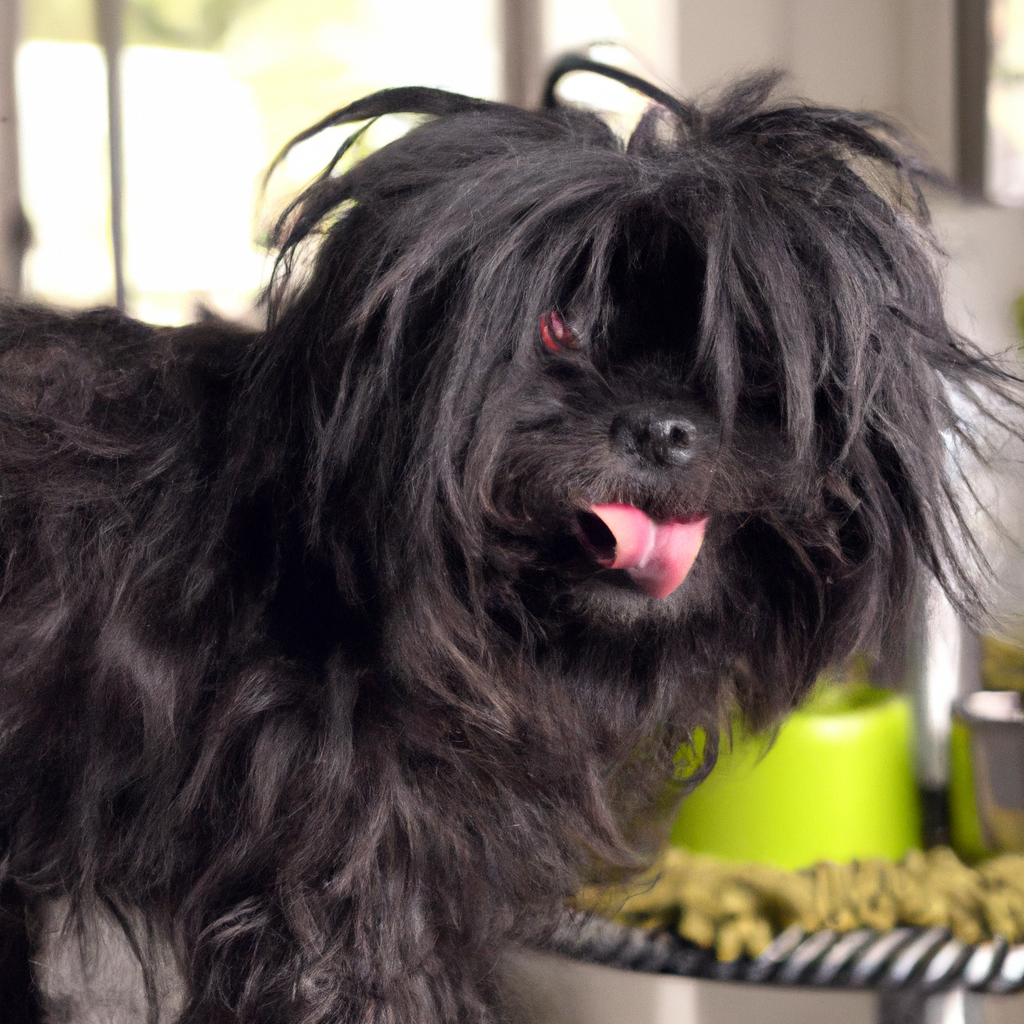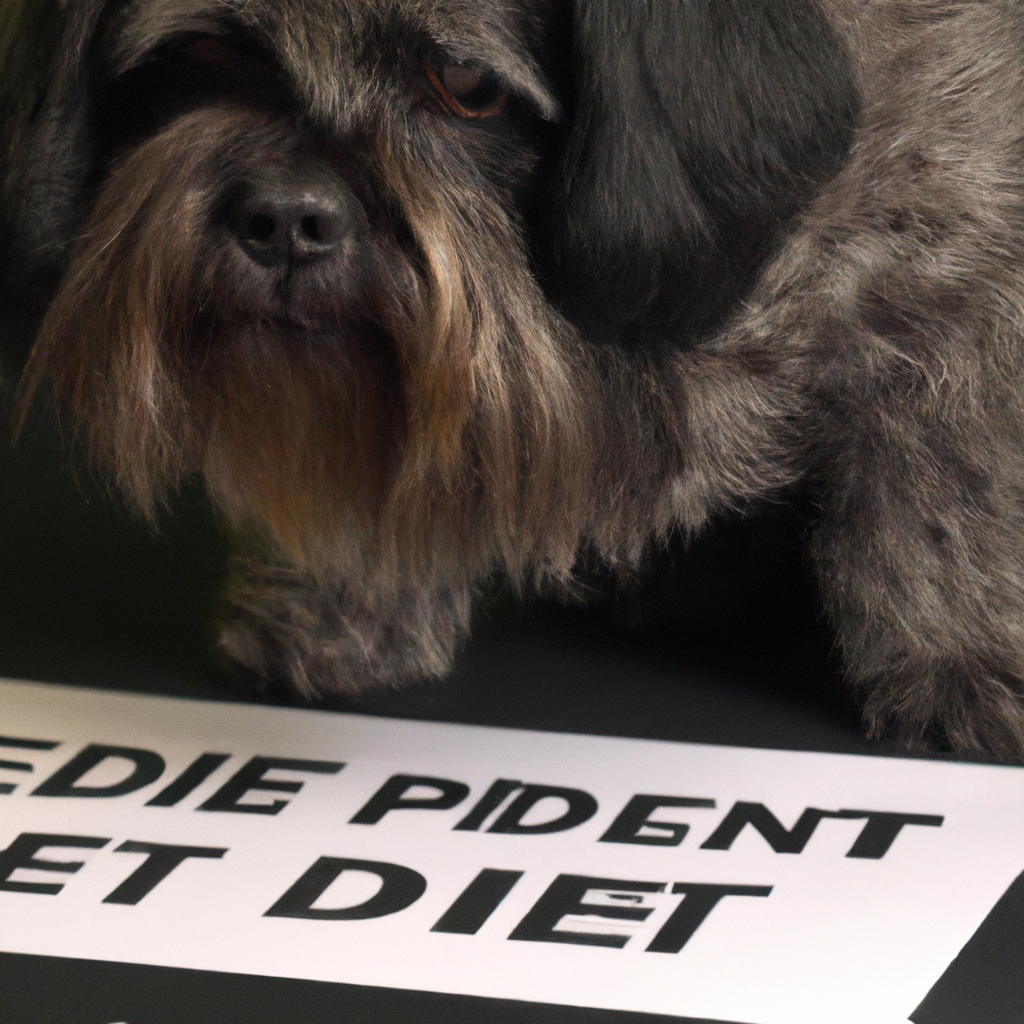The Affenpinscher, a small breed known for its distinctive “monkey-like” face, has specific nutritional requirements to maintain optimal health. These dogs require a balanced diet rich in proteins, carbohydrates, fats, vitamins, and minerals. Proteins are essential for muscle development, while carbohydrates provide the energy they need for their active lifestyle. Fats are crucial for maintaining a healthy coat and skin, and vitamins and minerals support overall health and immune function. Portion control is also important as Affenpinschers are prone to obesity. Special attention should be given to their diet to prevent health issues such as heart disease, diabetes, and joint problems.
Understanding the Dietary Needs of Affenpinscher Dogs
Affenpinscher dogs, often referred to as “Monkey Terriers” due to their distinct primate-like appearance, are small but energetic creatures that require a well-balanced diet to maintain their health and vitality. Understanding the dietary needs of Affenpinscher dogs is crucial for any owner who wants to ensure their furry friend lives a long, happy, and healthy life.
Affenpinschers, like all dogs, require a diet rich in proteins. Proteins are the building blocks of their bodies, supporting muscle development and tissue repair. High-quality sources of protein such as chicken, beef, fish, or lamb should make up a significant portion of their diet. However, it’s important to remember that not all proteins are created equal. Always opt for whole meats over meat meals or by-products to ensure your Affenpinscher is getting the highest quality protein possible.
In addition to protein, Affenpinschers also need a good balance of carbohydrates in their diet. Carbohydrates provide the energy these active little dogs need to fuel their playful antics. Whole grains like brown rice or oats are excellent sources of complex carbohydrates. They not only provide sustained energy but also contain essential nutrients and fiber that aid in digestion. Avoid feeding your Affenpinscher simple carbohydrates like corn or wheat, as these can lead to unhealthy weight gain and other health issues.
Fats are another essential component of an Affenpinscher’s diet. They provide a concentrated source of energy, help absorb vitamins, and contribute to a healthy coat and skin. Look for dog foods that contain healthy fats like omega-3 and omega-6 fatty acids. These can be found in ingredients like fish oil or flaxseed.
While proteins, carbohydrates, and fats make up the bulk of an Affenpinscher’s diet, they also require a variety of vitamins and minerals for optimal health. These can be found in fruits, vegetables, and certain types of grains. Vitamins like A, B, C, and E support a range of bodily functions, from boosting the immune system to promoting healthy skin and coat. Minerals like calcium and phosphorus are essential for strong bones and teeth.
Feeding your Affenpinscher a balanced diet that meets all these nutritional requirements can be a challenge. Commercial dog foods often claim to be “complete and balanced,” but it’s important to read the label carefully. Look for foods that list a high-quality source of protein as the first ingredient, and avoid those that contain artificial colors, flavors, or preservatives.
Portion control is another important aspect of feeding your Affenpinscher. These dogs are small and can easily become overweight if overfed. It’s recommended to feed adult Affenpinschers about 1/4 to 1/2 cup of high-quality dry food per day, divided into two meals. Puppies require more frequent feedings to support their rapid growth.
In conclusion, feeding your Affenpinscher a balanced diet that meets their nutritional needs is key to their overall health and well-being. By understanding these needs and making informed choices about what you feed your dog, you can help ensure they live a long, healthy, and happy life. Remember, every dog is unique, and what works for one Affenpinscher may not work for another. Always consult with your vet if you have any concerns about your dog’s diet or nutritional needs.
The Importance of Protein in an Affenpinscher’s Diet
Affenpinscher dogs, often referred to as “Monkey Terriers” due to their distinctive, primate-like faces, are a small but energetic breed. They are known for their playful and adventurous nature, which means they require a diet that can keep up with their high energy levels. One of the most crucial components of an Affenpinscher’s diet is protein.
Protein plays a vital role in the overall health and well-being of an Affenpinscher. It is the building block of their bodies, contributing to the growth and repair of muscles, tissues, and cells. It also aids in the production of hormones and enzymes that are essential for normal bodily functions. Without adequate protein, these little dogs could suffer from a range of health issues, including poor muscle tone, weakened immune system, and reduced energy levels.
The amount of protein an Affenpinscher needs can vary depending on their age, size, and activity level. Puppies, for instance, require more protein than adult dogs because they are growing and developing. Similarly, an active Affenpinscher that gets plenty of exercise will need more protein than a less active one to support their energy needs.
When it comes to the source of protein, it’s important to choose high-quality options. This means lean meats like chicken, turkey, and fish, as well as eggs and dairy products. These foods provide the essential amino acids that an Affenpinscher needs for optimal health. While plant-based proteins like beans and lentils can also be included in their diet, they should not be the primary source of protein as they do not provide all the necessary amino acids.
In addition to protein, an Affenpinscher’s diet should also include a balance of other nutrients. Carbohydrates provide them with the energy they need to stay active and playful, while fats help to keep their coat shiny and healthy. Vitamins and minerals are also essential for various bodily functions, including bone health and immune function.
However, it’s not just about what you feed your Affenpinscher, but also how much. Overfeeding can lead to obesity, which can cause a host of health problems, including heart disease and diabetes. Therefore, it’s important to monitor your Affenpinscher’s weight and adjust their food intake accordingly.
Feeding your Affenpinscher a balanced diet that is rich in high-quality protein can go a long way in ensuring they live a long, healthy, and happy life. It can support their high energy levels, contribute to strong muscles and a robust immune system, and help to keep their coat looking its best.
In conclusion, protein is a vital part of an Affenpinscher’s diet. It supports their growth, energy levels, and overall health. However, it’s important to remember that balance is key. While protein should make up a significant portion of their diet, other nutrients like carbohydrates, fats, vitamins, and minerals are also essential. And, as always, portion control is crucial to prevent overfeeding and obesity. With the right diet, your Affenpinscher can thrive and continue to bring joy and laughter into your life.
Vitamins and Minerals: Essential for Affenpinscher Health
Affenpinscher dogs, often referred to as “Monkey Terriers” due to their distinctive, primate-like appearance, are a small but energetic breed. Just like humans, these dogs have specific nutritional needs to maintain their health and vitality. Among these needs, vitamins and minerals play a crucial role in ensuring the overall well-being of your Affenpinscher.
Vitamins are organic compounds that are essential for normal growth and nutrition. They are required in small quantities because they cannot be synthesized by the body and must be obtained from the diet. For Affenpinschers, vitamins A, B, C, D, E, and K are particularly important.
Vitamin A is essential for your Affenpinscher’s vision, bone growth, and immune system. It can be found in foods like carrots, spinach, and sweet potatoes. B vitamins, including B6 and B12, are crucial for a healthy nervous system and can be found in whole grains, beans, peas, and lean meats. Vitamin C, an antioxidant, helps to protect your dog’s body from harmful free radicals and can be found in fruits and vegetables. Vitamin D helps regulate the balance and retention of calcium and phosphorus, promoting healthy bone growth. It can be found in fish and dairy products. Vitamin E is a powerful antioxidant that protects your dog from aging and disease. It can be found in leafy green vegetables, seeds, and nuts. Lastly, Vitamin K is necessary for blood clotting and can be found in leafy green vegetables and fish.
Minerals, on the other hand, are inorganic substances that are also essential for your Affenpinscher’s health. They play a role in various physiological processes, including bone formation, maintaining fluid balance, and carrying oxygen in the blood. Key minerals for your Affenpinscher include calcium, phosphorus, potassium, sodium, chloride, magnesium, and iron.
Calcium and phosphorus are vital for strong bones and teeth. Dairy products, fish, and bones are good sources of these minerals. Potassium, found in fruits and vegetables, is necessary for nerve function and muscle control. Sodium and chloride, typically found together as salt, are essential for maintaining fluid balance and proper cell function. Magnesium, found in nuts and grains, is necessary for various biochemical reactions in your dog’s body. Lastly, iron is crucial for carrying oxygen in the blood and can be found in meats and vegetables.
It’s important to note that while vitamins and minerals are essential for your Affenpinscher’s health, they should be given in the right amounts. Too much or too little of certain vitamins and minerals can lead to health problems. For instance, excessive calcium can lead to skeletal problems, especially in puppies. Similarly, too much vitamin A can lead to dehydration and joint pain.
To ensure your Affenpinscher gets the right balance of vitamins and minerals, it’s best to feed them a balanced, high-quality commercial dog food that is appropriate for their age, size, and health status. If you’re considering supplementing your dog’s diet with additional vitamins or minerals, it’s always best to consult with your vet first. They can provide guidance based on your dog’s specific needs and help prevent potential health problems caused by over or under-supplementation.
In conclusion, vitamins and minerals are essential for your Affenpinscher’s health. By providing a balanced diet and consulting with your vet, you can ensure your furry friend gets the nutrients they need to live a long, healthy life.
Balancing Fats and Carbohydrates for Affenpinscher Dogs
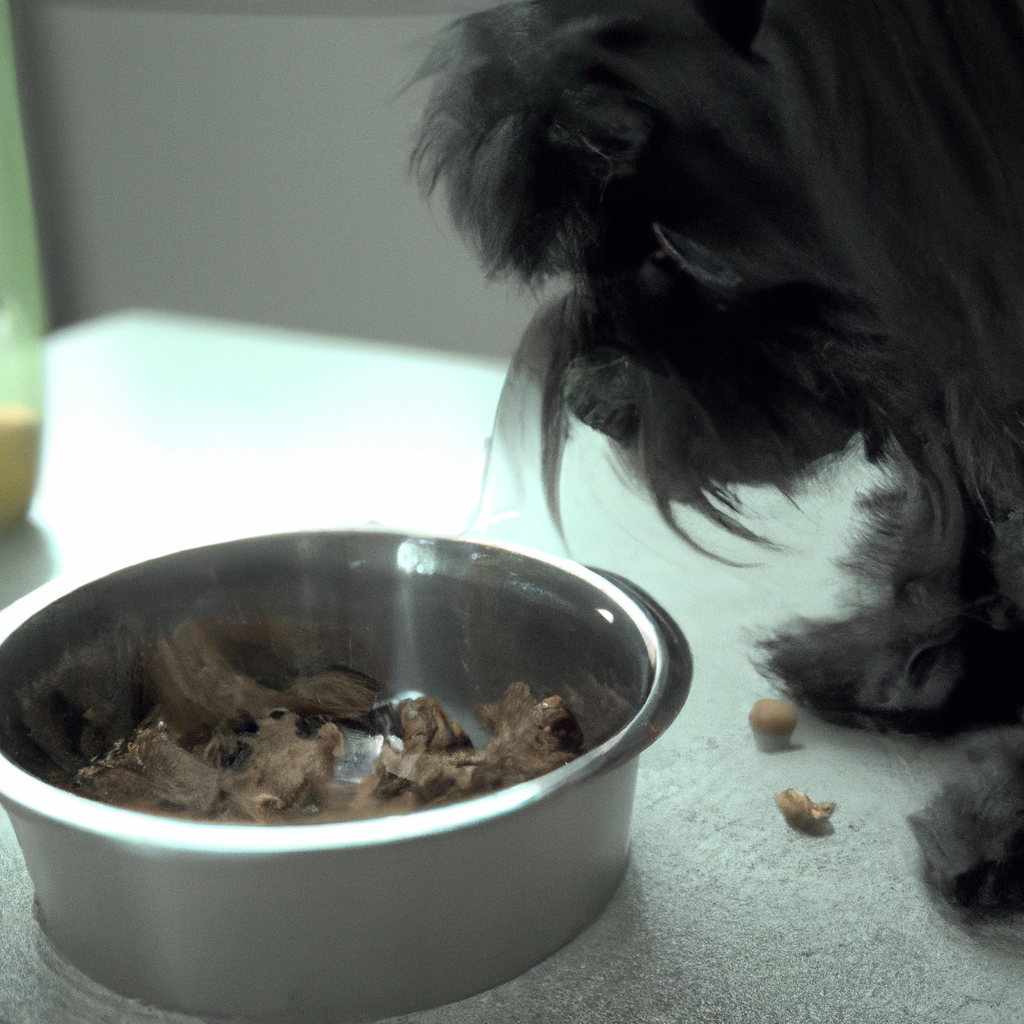
Affenpinscher dogs, often referred to as “Monkey Terriers” due to their distinct, primate-like appearance, are small but energetic creatures that require a well-balanced diet to maintain their health and vitality. One of the key aspects of their diet is the balance between fats and carbohydrates. Understanding the nutritional requirements of these dogs can help owners provide the best care for their furry friends.
Fats are an essential part of an Affenpinscher’s diet. They provide the most concentrated source of energy for these active dogs. Fats are not only necessary for energy but also play a crucial role in maintaining healthy skin and a shiny coat. They also aid in the absorption of certain vitamins, such as A, D, E, and K. However, it’s important to note that not all fats are created equal. Omega-3 and Omega-6 fatty acids, found in fish oil and flaxseed, are particularly beneficial for Affenpinschers. These fats help reduce inflammation and support brain function.
On the other hand, too much fat can lead to obesity and other health problems. Therefore, it’s essential to strike a balance. The amount of fat in an Affenpinscher’s diet should ideally make up around 10-15% of their total calorie intake. This percentage may vary depending on the dog’s age, size, and activity level. For instance, puppies and highly active dogs may require a slightly higher fat content.
Carbohydrates, while not as essential as fats, still play a significant role in an Affenpinscher’s diet. They provide a source of quick energy and are crucial for gut health. Carbohydrates found in fruits, vegetables, and whole grains provide dietary fiber, which aids in digestion and helps prevent constipation. They also contain essential vitamins and minerals that are not found in proteins and fats.
However, just like fats, carbohydrates need to be balanced in an Affenpinscher’s diet. Too many carbohydrates can lead to weight gain and other health issues. The carbohydrate content in an Affenpinscher’s diet should ideally make up around 30-40% of their total calorie intake. Again, this percentage may vary depending on the dog’s age, size, and activity level.
When it comes to feeding your Affenpinscher, it’s not just about the quantity of fats and carbohydrates, but also the quality. Always opt for high-quality, natural sources of fats and carbohydrates. Avoid foods with artificial additives and fillers. Remember, a well-balanced diet is key to your Affenpinscher’s overall health and well-being.
In conclusion, balancing fats and carbohydrates in an Affenpinscher’s diet is crucial. Fats provide a concentrated source of energy and help maintain healthy skin and a shiny coat, while carbohydrates provide quick energy and support gut health. However, both need to be balanced to prevent health issues such as obesity. Always opt for high-quality, natural sources of fats and carbohydrates, and adjust the amounts based on your dog’s age, size, and activity level. With the right diet, your Affenpinscher can lead a healthy, active, and happy life.
Feeding Guide: Portion Sizes and Meal Frequency for Affenpinschers
Affenpinscher dogs, often referred to as “Monkey Terriers” due to their distinct primate-like appearance, are small but energetic breeds that require a well-balanced diet to maintain their health and vitality. Understanding the nutritional requirements of Affenpinschers is crucial for their overall well-being.
When it comes to feeding your Affenpinscher, portion sizes and meal frequency play a significant role. These dogs typically weigh between 7 to 10 pounds, and their diet should be proportionate to their size. It’s important to remember that while they may be small, Affenpinschers are known for their high energy levels. Therefore, their diet should be rich in proteins to support their active lifestyle.
A general rule of thumb is to feed an adult Affenpinscher about 1/2 to 1 cup of high-quality dry food per day, divided into two meals. This amount can vary depending on the dog’s age, size, build, metabolism, and activity level. Puppies, for instance, require more frequent meals – about three to four times a day – to support their rapid growth and development.
However, it’s not just about the quantity of food, but also the quality. Affenpinschers need a diet that is rich in high-quality proteins, carbohydrates, and fats. Proteins are essential for muscle development and repair, while carbohydrates provide the energy they need for their active lifestyle. Fats, on the other hand, are necessary for maintaining a healthy coat and skin.
In addition to these macronutrients, Affenpinschers also require a range of vitamins and minerals for optimal health. These include calcium and phosphorus for strong bones and teeth, omega-3 and omega-6 fatty acids for a healthy coat and skin, and a variety of vitamins for overall health and immune support.
While commercial dog foods often provide a balanced diet, it’s important to read the labels carefully. Look for foods that list a source of animal protein, such as chicken or beef, as the first ingredient. Avoid foods that contain fillers like corn and wheat, as these can lead to obesity and other health problems.
Feeding your Affenpinscher a balanced diet is not just about meeting their nutritional requirements, but also about preventing health issues. These dogs are prone to certain health conditions like hip dysplasia, heart problems, and obesity. A diet that is rich in nutrients and portion-controlled can help manage these conditions and promote a long, healthy life.
It’s also worth noting that every Affenpinscher is unique, and what works for one may not work for another. Therefore, it’s always a good idea to consult with your vet to determine the best diet for your specific dog. They can provide personalized advice based on your dog’s age, weight, activity level, and health status.
In conclusion, feeding your Affenpinscher requires a careful balance of portion sizes, meal frequency, and nutrient-rich foods. By understanding their nutritional requirements and tailoring their diet accordingly, you can ensure that your Affenpinscher stays healthy, active, and happy throughout their life.
Special Nutritional Considerations for Affenpinscher Puppies
Affenpinscher puppies, often referred to as “Monkey Dogs” due to their distinctive, primate-like appearance, are a small but energetic breed that requires a diet tailored to their unique nutritional needs. These adorable little furballs are not just known for their playful and adventurous nature, but also for their specific dietary requirements that are essential for their growth and development.
When it comes to feeding your Affenpinscher puppy, it’s important to remember that they are not just smaller versions of adult dogs. Their bodies are growing and developing at a rapid pace, which means they have different nutritional needs compared to their adult counterparts. For instance, puppies require more protein to support their growing muscles and tissues. Protein is the building block of the body, and a diet rich in high-quality protein sources like chicken, beef, or fish can help your Affenpinscher puppy grow into a strong and healthy adult.
In addition to protein, Affenpinscher puppies also need a good balance of fats in their diet. Fats are a concentrated source of energy, which is particularly important for this energetic breed. They provide essential fatty acids that are crucial for brain and eye development, especially during the puppy’s first few months. Look for diets that include healthy fats like omega-3 and omega-6 fatty acids.
Carbohydrates are another important component of your Affenpinscher puppy’s diet. They provide the energy your puppy needs to fuel their playful antics. However, it’s important to choose complex carbohydrates like sweet potatoes or brown rice, as these are easier for your puppy to digest and provide a steady release of energy.
While protein, fats, and carbohydrates are the main components of your puppy’s diet, they also need a range of vitamins and minerals for overall health. Calcium and phosphorus are particularly important for bone development, while vitamins A and E support the immune system and eye health. Many high-quality puppy foods will include these nutrients, but it’s always a good idea to check the label to make sure.
Feeding your Affenpinscher puppy may seem like a daunting task, but it doesn’t have to be. Start by choosing a high-quality puppy food that is specifically formulated for small breeds. These foods are designed with the nutritional needs of small breed puppies in mind, and often come in smaller kibble sizes that are easier for your puppy to eat.
Remember, every puppy is unique and may have different nutritional needs. It’s always a good idea to consult with your vet to determine the best diet for your Affenpinscher puppy. They can provide personalized advice based on your puppy’s age, size, and overall health.
In conclusion, feeding your Affenpinscher puppy a balanced diet that is rich in protein, fats, and carbohydrates, along with essential vitamins and minerals, can help them grow into a healthy and happy adult. With the right nutrition, your Affenpinscher puppy will have the energy they need to explore the world around them and bring joy to your life for many years to come.
Addressing Common Nutritional Issues in Affenpinscher Dogs
Affenpinscher dogs, often referred to as “Monkey Terriers” or “Monkey Dogs” due to their distinct primate-like appearance and personality, are a small but sturdy breed known for their playful and adventurous nature. Like all dogs, Affenpinschers have specific nutritional needs that must be met to ensure their overall health and well-being. However, this breed can sometimes face unique nutritional challenges that require special attention.
One common issue that Affenpinscher owners may encounter is food allergies. These dogs are known to have sensitive stomachs, and certain foods can trigger allergic reactions. Symptoms can range from mild, such as itching and skin irritations, to severe, including gastrointestinal problems like vomiting and diarrhea. If you notice any of these signs, it’s crucial to consult with your vet to identify the allergen and adjust your dog’s diet accordingly. Common culprits often include grains, dairy, and certain proteins like chicken or beef. Hypoallergenic dog foods, which are free from common allergens, can be a good option for Affenpinschers with food allergies.
Another nutritional issue that can affect Affenpinschers is obesity. Despite their small size, these dogs have a big appetite and can easily gain weight if their diet isn’t carefully managed. Overweight dogs are at risk for a host of health problems, including heart disease, diabetes, and joint issues. To prevent obesity, it’s important to feed your Affenpinscher a balanced diet that’s high in protein to support their active lifestyle, but low in fats and sugars. Portion control is also key – while it’s tempting to spoil your furry friend with treats, these should be given sparingly.
Affenpinschers, like many small breeds, are also prone to dental issues. Small breeds have a higher risk of periodontal disease due to the close proximity of their teeth, which can lead to a buildup of plaque and tartar. To help maintain your Affenpinscher’s dental health, consider incorporating dental chews into their diet, which can help clean their teeth as they chew. Additionally, look for dog foods that promote dental health, often these foods are specially designed to clean the teeth as the dog eats.
Lastly, Affenpinschers are known for their energy and vivacity, and they require a diet that can keep up with their active lifestyle. Look for high-quality dog foods that are rich in proteins and complex carbohydrates to provide the energy they need. However, it’s important to remember that not all proteins and carbs are created equal. Look for whole, natural ingredients like lean meats, fish, brown rice, and vegetables. Avoid foods with fillers like corn, wheat, and soy, as these provide little nutritional value and can lead to digestive issues.
In conclusion, while Affenpinschers may face some unique nutritional challenges, these can be easily managed with a little knowledge and care. By understanding your Affenpinscher’s nutritional needs and being aware of potential issues, you can ensure your furry friend stays healthy and happy. Remember, every dog is unique, and what works for one Affenpinscher may not work for another. Always consult with your vet before making any major changes to your dog’s diet. With the right nutrition, your Affenpinscher can lead a long, active, and fulfilling life.
Choosing the Right Dog Food for Your Affenpinscher
Choosing the right dog food for your Affenpinscher is a crucial aspect of ensuring their overall health and well-being. Affenpinschers, also known as “Monkey Terriers,” are small, energetic dogs known for their playful and adventurous nature. Despite their small size, they have a big appetite and specific nutritional requirements that need to be met to keep them healthy and active.
Affenpinschers require a balanced diet that includes proteins, carbohydrates, fats, vitamins, and minerals. Proteins are essential for their growth and development, and they should form the largest portion of their diet. High-quality animal proteins such as chicken, beef, fish, or lamb are ideal for Affenpinschers. These proteins provide the essential amino acids that your dog needs to build and repair body tissues.
Carbohydrates are another important component of an Affenpinscher’s diet. They provide the energy that these active dogs need to fuel their daily activities. However, it’s important to choose complex carbohydrates like sweet potatoes, brown rice, or oats, which are easier for your dog to digest and provide a steady release of energy.
Fats are also essential for Affenpinschers. They not only provide energy but also support brain development, keep the skin and coat healthy, and aid in the absorption of certain vitamins. Healthy sources of fats include fish oil, flaxseed, and chicken fat. However, it’s important to monitor the fat content in your dog’s diet to prevent obesity, a common health issue in small breeds like Affenpinschers.
Vitamins and minerals are vital for various bodily functions. They support the immune system, bone health, and metabolic processes. Most high-quality commercial dog foods are fortified with essential vitamins and minerals. However, it’s always a good idea to consult with your vet to ensure your Affenpinscher is getting all the nutrients they need.
When choosing a dog food for your Affenpinscher, it’s important to consider their age, size, and activity level. Puppies require more protein and calories to support their growth and development, while adult dogs need a balanced diet to maintain their health. Senior Affenpinschers may require a diet lower in calories but higher in fiber and certain nutrients to support their aging bodies.
It’s also worth noting that Affenpinschers, like many small breeds, are prone to dental issues. Therefore, dry kibble is often recommended as it can help to keep their teeth clean and healthy. However, some Affenpinschers may prefer wet food, which is easier to chew and can be more palatable. A mix of both can provide a balance of taste and dental benefits.
Lastly, remember that every dog is unique. What works for one Affenpinscher may not work for another. It’s important to monitor your dog’s weight, energy levels, and overall health and adjust their diet as needed. Regular vet check-ups can also help to ensure your Affenpinscher is thriving on their diet.
In conclusion, feeding your Affenpinscher a balanced, high-quality diet that meets their specific nutritional requirements is key to their health and happiness. With the right food and plenty of love and care, your Affenpinscher can live a long, healthy, and active life.In conclusion, Affenpinscher dogs require a balanced diet that includes proteins, carbohydrates, fats, vitamins, and minerals. Their diet should be high in protein to support their energy levels and muscle health. Carbohydrates provide them with energy, while fats are essential for skin and coat health. Vitamins and minerals are necessary for overall health and immune system support. Portion control is important to prevent obesity, and their nutritional needs may change with age, health status, and activity level. Therefore, it’s recommended to consult with a vet for personalized nutritional advice.

